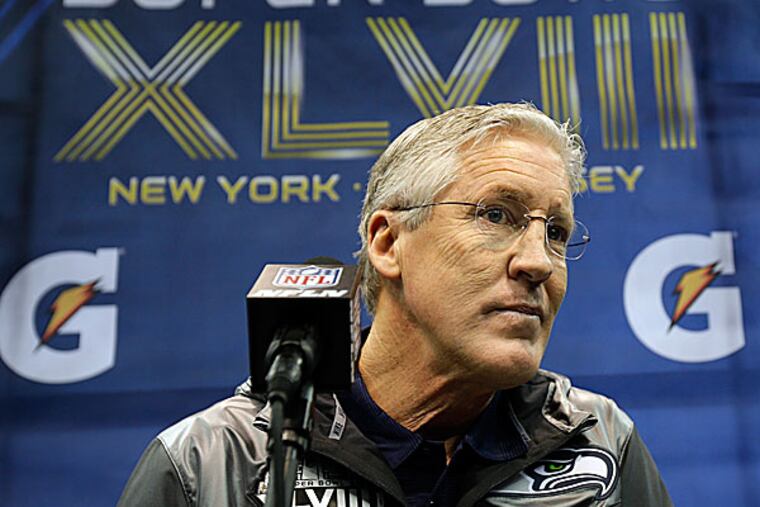Carroll's fresh approach works for Seahawks
NEWARK, N.J. - When cornerback Walter Thurmond joined the Seattle Seahawks as a rookie in 2010, he needed precious little time to adjust to the pumped-up pace of coach Pete Carroll's practices. For the previous four years, Thurmond had played at the University of Oregon. As a senior, he'd played for Chip Kelly. Fast was easy. Fast was what he knew. Yes, this was barely an adjustment for him at all.

NEWARK, N.J. - When cornerback Walter Thurmond joined the Seattle Seahawks as a rookie in 2010, he needed precious little time to adjust to the pumped-up pace of coach Pete Carroll's practices. For the previous four years, Thurmond had played at the University of Oregon. As a senior, he'd played for Chip Kelly. Fast was easy. Fast was what he knew. Yes, this was barely an adjustment for him at all.
"Practice was probably faster at Oregon just because they preach that up-tempo," Thurmond said. "You run down on the play 30 yards downfield, and you have to run back because they're already lined up to run another play. Practices were always ridiculous fast, but the competition level was still high. It's still the same in that manner."
At Super Bowl XLVIII media day on Tuesday, Thurmond was the most direct link between two coaches who have achieved success quickly in the NFL by breaking from some time-honored presumptions and stereotypes. In guiding the Eagles to the NFC East title in his first season, Kelly earned no small measure of vindication for rewriting the typical NFL team's practice schedule, diet program, and offensive playbook.
Four years after leaving Southern Cal, Carroll has led the Seahawks to three playoff appearances and has them on the brink of a championship, using the same rah-rah-sis-boom-bah approach that helped him build the Trojans into a juggernaut.
"Pete's just a real West Coast, laid-back dude," Thurmond said. "Chip's from the East. He's a little bit more hard-nosed. Personality-wise, they're a little different, but their styles of coaching and practicing are identical."
It used to be that a franchise took a substantial risk by plumbing college football for a new head coach, that the transition was too challenging, the divide between college and pro too great to be breached. But Kelly and Carroll have put the lie to that notion, and the manner in which Carroll's methods and sensibilities complement the roster that he and general manager John Schneider have constructed ought to be encouraging and instructive for Kelly and Eagles GM Howie Roseman.
After the New England Patriots fired him as their head coach following the 1999 season, Carroll said, he realized that he had never thought the same way that "older, traditional" coaches had, and it was time to embrace the qualities that made him different. It was time to be authentic. Once that approach worked at USC (NCAA penalties notwithstanding), he said, "I wanted to see what would happen if we translated this to the NFL."
It has worked, because he has an audience receptive to his methods and message. On their 53-man active roster, the Seahawks have 32 players who are age 26 or younger. They're not loaded with jaded veterans who might roll their eyes at Carroll's outbursts of enthusiasm. Most of them are still at the stages of their careers and lives when they're hungry, either to win or to secure a big payday, and they're more willing to listen to and respect a coach who doesn't come off as a fuddy-duddy.
"It's a young man's game," Thurmond said. "It's easier for guys to buy into the program, being young. That's the biggest thing. When you have guys who can buy into the program and are kind of naive to the business aspect, they give you their all. When you have guys who are six, seven, eight years into the game, they know how it is. It's a job for them. Something's missing, a little bit. They're kind of hip to what's going on."
Does this mean that an older, more experienced team with a more traditional coach can't win in today's NFL? Of course not. But there's something to be said for aligning a certain kind of coach with a certain kind of roster, and the Eagles, to their credit, did that with Kelly.
Of the 64 players that the Eagles listed on their roster at their season's conclusion, 45 were age 26 or younger. Those players were open to a fresh voice, a fresh approach, and the results spoke for themselves. The Eagles should be mindful of that dynamic, if they aren't already. It's already helped put one team in position to win a championship.